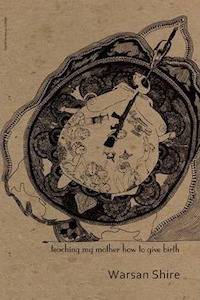

You were at school.” Then the second, “Your mother was sixteen when he first kissed her.” The third, “the friend laughed, mouth bloody with grapes,/ then plunged a hand between your mother’s legs.” And the final quatrain: “Last week, she saw him driving the number 18 bus” (8). The first is clear: “she remembers hearing this/ from your uncle, then going to your bedroom and lying/ down on the floor. For instance, in the second poem, “Your Mother’s First Kiss”, in four quatrains we move through four scenes, dislocated in time. Though the chapbook is bookended by two very short poems, most of the pieces include distinct things happening to distinct characters in distinct places. Particularly, her poetry in this small chapbook is marked by a strong sense of narrative, clear scene work, fresh body imagery, and a thematic consistency around femininity. This little chapbook feels solid, weighty, and Shire does a fine job of creating consistency in such a short amount of space. They are not struggling to find a voice, but are grounded firmly in their style and language.


No one leaves home until home is a damp voice in your ear saying leave, run now, i don't know what i've become.There is a real casual ease by which the poems in Teaching My Mother How to Give Birth present themselves. I want to go home, but home is the mouth of a shark home is the barrel of the gun and no one would leave home unless home chased you to the shore unless home tells you to leave what you could not behind, even if it was human. The dirty looks in the street softer than a limb torn off, the indignity of everyday life more tender than fourteen men who look like your father, between your legs, insults easier to swallow than rubble, than your child's body in pieces - for now, forget about pride your survival is more important. No one would choose to crawl under fences, be beaten until your shadow leaves you, raped, then drowned, forced to the bottom of the boat because you are darker, be sold, starved, shot at the border like a sick animal, be pitied, lose your name, lose your family, make a refugee camp a home for a year or two or ten, stripped and searched, find prison everywhere and if you survive and you are greeted on the other side with go home blacks, refugees dirty immigrants, asylum seekers sucking our country dry of milk, dark, with their hands out smell strange, savage - look what they've done to their own countries, what will they do to ours? Who would choose to spend days and nights in the stomach of a truck unless the miles travelled meant something more than journey. Migrants hang onto flotation tubes in the sea after jumping from an overloaded wooden boat during a rescue operation 16 kilometres off the coast of Libya.


 0 kommentar(er)
0 kommentar(er)
